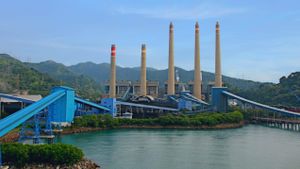Welcome back to VOI's signature Series. From day to day, more and more young people are adept at getting money. Age is no longer relevant to be a measure of success, including in terms of wealth. The inaugural article of the "Young, Rich, and Happy" Series will expose what industry actually produces the most billionaires?
Almost every year the number of rich people in Indonesia increases. Interestingly, currently those who are classified as successful are no longer set to their age. Every day there are more and more young people who can be said to be successful and become rich. The question is, what industry actually produces the most rich people?
Last year, the consulting firm Capgemini released reports on the richest people from around the world. In the report titled World Health 2020, it was noted that the number of rich people in Indonesia increased by three percent from 129 thousand people in 2018 to 134 thousand.
In 2018, the number of rich Indonesians was the largest in Southeast Asia. However, last year's report, the position is equal to Thailand, which also recorded the number of richest people as many as 134 thousand people.
The richest people in the World Wealth Report version are those who have a wealth of more than 1 million US dollars or Rp.14.1 billion. What is calculated is the investable assets, such as money, savings, and stocks.
The closest example at this time is the founder of the application company Gojek cum the Minister of Education and Culture, Nadiem Makarim. At the age of 25, this Harvard University graduate had founded Gojek. And at his age, who is already 36 years old, his net worth has reached IDR 1.2 trillion.
Besides Nadiem, another rich young person is the founder of Tokopedia William Tanuwijaya. The man who was born in Pematang Siantar, North Sumatra, 11 November 1981 has started a company that has now become a unicorn since 2007. At that time, William was only 25 years old. The same age as Nadiem when he founded Gojek.
Initially, William had difficulty finding investors to invest in the company he wanted to develop. After two years of convincing many people, his efforts had just paid off. Now, more than a decade ago, the valuation of the company that he has cared for since birth reached more than 1 billion US dollars (US). Meanwhile, his net worth is US $ 345 million.

Then still from a similar industry, there is the name Achmad Zaky, the founder of Bukalapak, who is one of the richest young people in Indonesia. Because of his richness, the man who was born on August 24, 1986 (34 years) has been included in the 150 richest Indonesians according to Globe Asia Magazine.
We can name a number of successful people, from the most famous to the less well-known, such as the founder of the online donation platform Kitabisa.com, M. Alfatih Timur; Lifepal founder, Benny Fajarai; to HijUp's boss, Diajeng Lestari. And they mostly come from the same industry: technology. Although it is indeed divided into different niches.
Perhaps technology is indeed the brightest industry and looks very promising to rake in billions of money. However, if you look at the data, the Wealth-X Billionarire Census 2020, it is precisely the technology industry that is in seventh place of the industry that has scored the most billionaires.
Meanwhile, the report noted that the industries that produced the most billionaires were banking and finance at 19.8 percent. The second number is from the conglomerate industry at 12.8 percent.
Then in third place there is property as much as 7.6 percent. Fourth, food and beverages 5.7 percent. The fifth is health 5.7 percent, the sixth is manufacturing 5.6 percent, the seventh technology is 5.6 percent, the eight non-profit and social organizations are 4.9 percent, the ninth is hospitality and entertainment 4.5 percent, and the tenth fashion is 4.3 percent.
The question is, if you see the fanfare in the public space, and the many success stories of startup founders, why isn't the technology industry the first to score the most billionaires?

The Wealth-X report, according to marketing observer Inventure Consulting Yuswohady makes sense. For one of the biggest reasons, namely throughout 2020 the world was hit by the COVID-19 pandemic. "Due to recession, pandemic, money has become expensive," he said when interviewed by VOI.
In the past, investors liked to "burn money", said Yuswohady, now many investors are holding back their money. "It makes sense, if in the past investors burned money, such as Bukalapak, Tokopedia, that money was cheap to acquire customers and increase value in the IPO. Not only in Indonesia, but throughout the world."
In addition, Yuswohady also explained that the technology business or startup industry that had just emerged around 2015 was actually unclear about the benefits. He gave an example of multi-national companies such as transportation services based on the Uber application and the platform for providing temporary housing, Airbnb, which he said was unclear and many had yet to IPO.
"Initially, there were many startups excited, but until 2019 the results were not visible. It became a bad portrait of digital companies in the 2015s era," said Yuswohady.
Even in the country like Gojek, said Yuswohady, their business performance has not been proven. According to him, even though some have started to take profits, it is not much.
"Just like Gojek, for example in Indonesia, it doesn't seem to be profitable yet. But even if it's profitable, it's not that much. Tokopedia, Bukalapak, then Traveloka, Tiket.com, with the pandemic, have added losses," he explained.
This is also what Yuswohady said made the phenomenon of "cheap money" begin to fade since 2020. "And investors are returning to the conventional sector," he said.
Follow this edition of the Writing Series: "Young, Rich, and Happy"
The English, Chinese, Japanese, Arabic, and French versions are automatically generated by the AI. So there may still be inaccuracies in translating, please always see Indonesian as our main language. (system supported by DigitalSiber.id)













